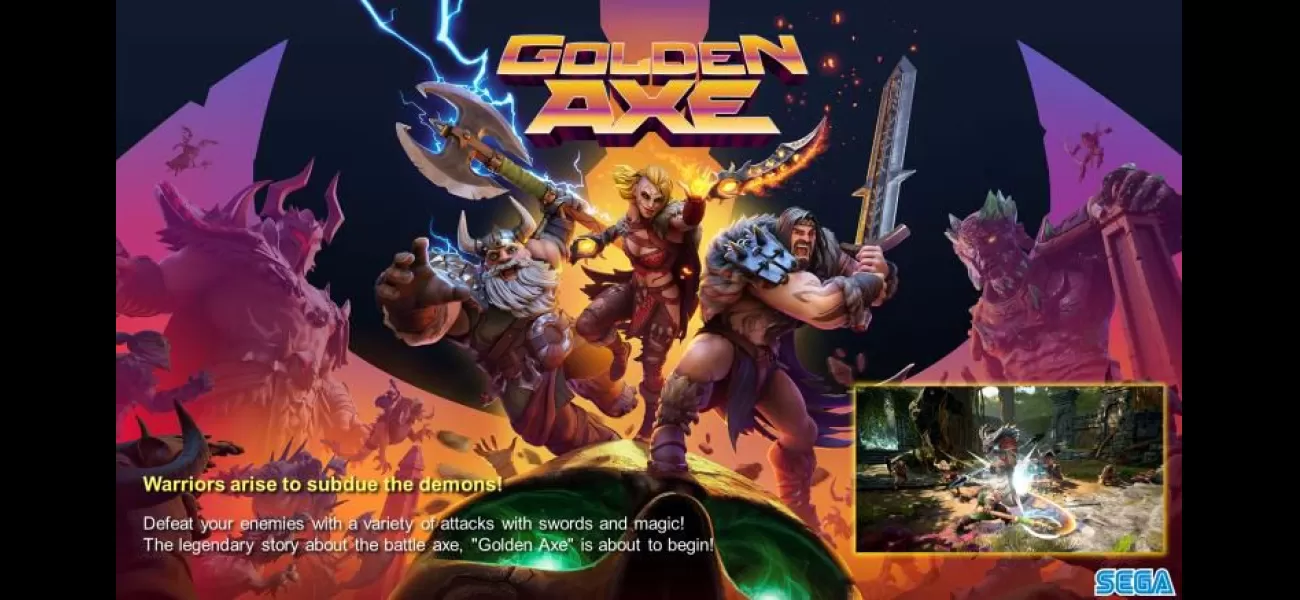Old school games could revitalize the struggling video game industry, according to reader's opinion piece.
A reader recommends using retro gaming as a blueprint for creating games that are efficient, cost-effective, and creative.
April 7th 2024.

Is it time to revisit the classic game, Golden Axe? One reader believes that gaming companies should take inspiration from retro gaming to create games more efficiently, affordably, and creatively.
Like many others, I have been feeling lost and hopeless as Microsoft and Sony seem to be abandoning traditional console gaming without a clear plan in place. It has become evident that there are multiple reasons for this, including the impact of the pandemic and concerns about a lack of growth in the market. However, the main issue at hand is that the cost of making games has skyrocketed.
The most obvious solution would be to reduce budgets, but this doesn't seem to be a consideration. It appears that these companies are either all-in or completely giving up on traditional gaming in favor of live service games, rather than simply scaling back on budget.
At the same time, I've noticed a rise in interest for retro gaming, even among younger gamers who have grown up in a digital-only, touchscreen-dominated world. This initially surprised me, but then I realized that classic arcade games offer a similar experience to modern mobile games in terms of gameplay. This led me to think about Sega's plan to revive their old arcade games with smaller budgets and a smaller scale. I'm not sure if this decision was influenced by the current situation, but it puts them in a perfect position to release their games at a time when people are seeking more affordable and shorter gaming experiences.
While I know that this is Sega we're talking about, and they may not execute this plan successfully, in my mind, their games would be priced at half the cost of triple-A games and could be completed in about 10 hours. Essentially, they would be like indie games with higher production values and recognizable characters.
The problem for gaming companies now is not convincing consumers to play more modest games, as they already do with indie and mobile games. The real challenge lies in convincing game developers themselves, who seem to only work at one speed, creating giant quadruple-A games. They need to be open to taking risks and experimenting with different types of games, but they just can't seem to break away from their current mindset.
Instead of buying one game for £70, why not purchase three games for £23 each? These games would take less time to develop and could offer more variety and creativity due to the lower budget.
Unfortunately, I doubt that this will happen. There may be a chance that Sega's plan is successful and others follow suit, but I suspect it will only be Japanese companies. Western companies seem to have an "all or nothing" mentality that they can't shake, and it's clearly not working.
I miss the days when we used to receive new games from developers like Insomniac, Naughty Dog, Bethesda, and BioWare every year or two. Each game would be different from the last, and that's what made gaming in the Xbox 360 era and before so exciting. Nowadays, we wait six years for a new game, only to find out that it's just more of the same.
If the gaming industry is to survive, this needs to change. We need more frequent releases from developers, with each game bringing something new to the table. Let's hope that we see a return to the retro days, where gaming was more about having fun and taking risks, rather than just chasing profit.
By Grackle
Like many others, I have been feeling lost and hopeless as Microsoft and Sony seem to be abandoning traditional console gaming without a clear plan in place. It has become evident that there are multiple reasons for this, including the impact of the pandemic and concerns about a lack of growth in the market. However, the main issue at hand is that the cost of making games has skyrocketed.
The most obvious solution would be to reduce budgets, but this doesn't seem to be a consideration. It appears that these companies are either all-in or completely giving up on traditional gaming in favor of live service games, rather than simply scaling back on budget.
At the same time, I've noticed a rise in interest for retro gaming, even among younger gamers who have grown up in a digital-only, touchscreen-dominated world. This initially surprised me, but then I realized that classic arcade games offer a similar experience to modern mobile games in terms of gameplay. This led me to think about Sega's plan to revive their old arcade games with smaller budgets and a smaller scale. I'm not sure if this decision was influenced by the current situation, but it puts them in a perfect position to release their games at a time when people are seeking more affordable and shorter gaming experiences.
While I know that this is Sega we're talking about, and they may not execute this plan successfully, in my mind, their games would be priced at half the cost of triple-A games and could be completed in about 10 hours. Essentially, they would be like indie games with higher production values and recognizable characters.
The problem for gaming companies now is not convincing consumers to play more modest games, as they already do with indie and mobile games. The real challenge lies in convincing game developers themselves, who seem to only work at one speed, creating giant quadruple-A games. They need to be open to taking risks and experimenting with different types of games, but they just can't seem to break away from their current mindset.
Instead of buying one game for £70, why not purchase three games for £23 each? These games would take less time to develop and could offer more variety and creativity due to the lower budget.
Unfortunately, I doubt that this will happen. There may be a chance that Sega's plan is successful and others follow suit, but I suspect it will only be Japanese companies. Western companies seem to have an "all or nothing" mentality that they can't shake, and it's clearly not working.
I miss the days when we used to receive new games from developers like Insomniac, Naughty Dog, Bethesda, and BioWare every year or two. Each game would be different from the last, and that's what made gaming in the Xbox 360 era and before so exciting. Nowadays, we wait six years for a new game, only to find out that it's just more of the same.
If the gaming industry is to survive, this needs to change. We need more frequent releases from developers, with each game bringing something new to the table. Let's hope that we see a return to the retro days, where gaming was more about having fun and taking risks, rather than just chasing profit.
By Grackle
[This article has been trending online recently and has been generated with AI. Your feed is customized.]
[Generative AI is experimental.]
0
0
Submit Comment





